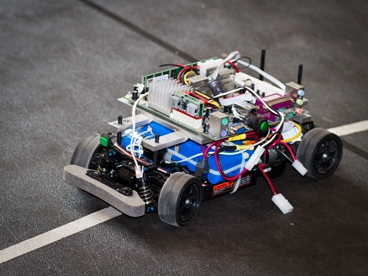‘Smart car’ model predicts the behavior of human drivers
June 15, 2011

The researchers test their algorithm using a miniature autonomous vehicle traveling along a track that partially overlaps with a second track for a human-controlled vehicle, observing incidences of collision and collision avoidance (credit: Melanie Gonick)
MIT researchers have developed a software system for “smart cars” that predicts the behavior of other human drivers, to prepare for a world where the road is shared by both human and artificially intelligent drivers.
They tested their algorithms with toy-sized cars on a miniature track.
The key of their research is to create a system that carefully evaluates drivers based on their behavior and flags trouble cars.
Researchers set up 100 potential collision scenarios on two overlapping circular tracks, with some cars remote-controlled by human drivers and other cars operating based on preset algorithms.
Out of the 100 trials, there were 97 instances of collision avoidance, and 3 crashes. The researchers attributed the three crashes to lag between the on-board systems and roadside workstations, which capture and transmit information about the human-controlled cars.
There are plans to improve the system by adding provisions to account for weather and road conditions, and to take into account traits unique to the car.